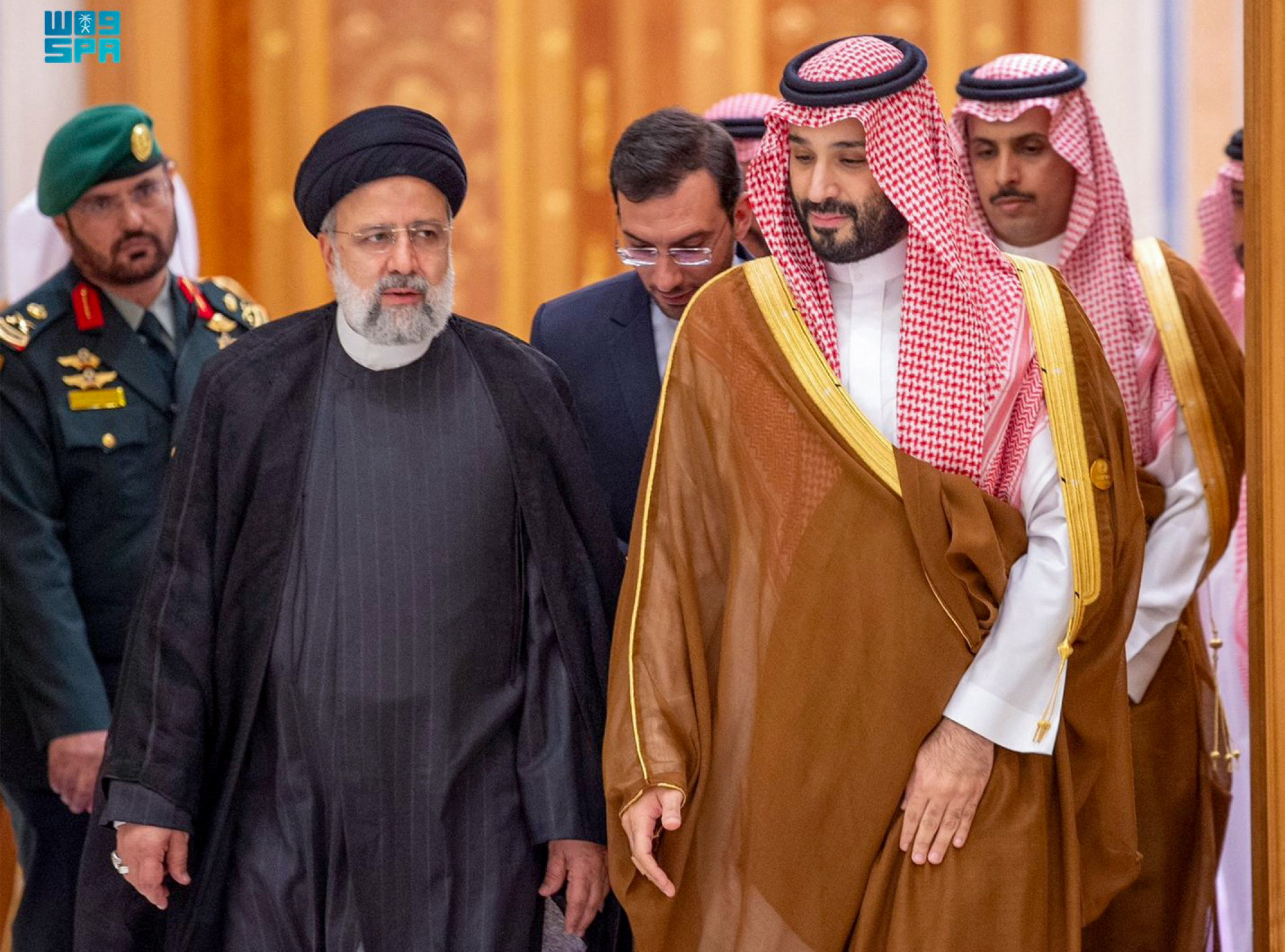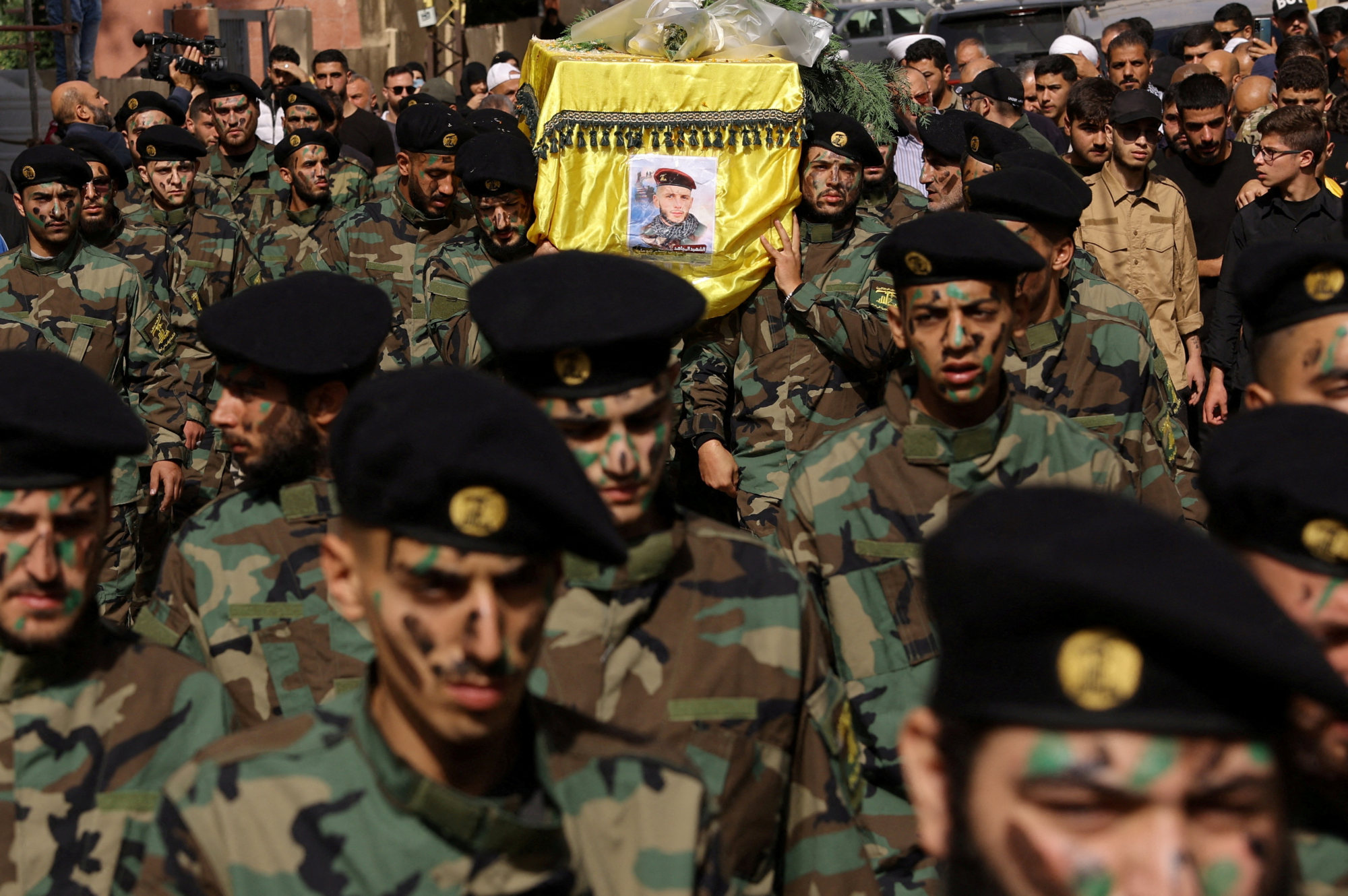
Israel-Gaza war: Iran and US wary of wider conflict even as Tehran fuels proxy wars
- Iran-backed Hezbollah is taking ‘minimum’ military actions against Israel to show it is supporting other militant groups, an analyst says
- Israel and Arab states are already assessing the scenarios for post-war Gaza including control over the territory and reconstruction
But Tehran and Washington, aided by Arab state intermediaries, appear determined to prevent a spillover of the ongoing war because of the heavy strategic price they would all pay, Middle East observers told This Week In Asia.
“Neither the US nor Iran is interested in expanding the conflict, [but] that said, there is the danger of escalation, as each party seeks to maintain the edge in their tit-for-tat strikes,” said Kristin Diwan, a senior resident scholar of the Arab Gulf States Institute in Washington.
Parallel to Israel’s military capture of most of northern Gaza over the past week, its forces have become engaged in incrementally more cross-border fighting with the Lebanese Hezbollah.
‘Peace only on paper’: Gaza war sharpens Arab world’s grievances against Israel
The Iran-backed militant group has reportedly assumed operational control of the conflict alongside Hamas and has deployed a growing array of increasingly sophisticated weapons against Israeli forces along the border, killing more Israelis and prompting retaliatory air strikes deeper into Lebanese territory.
“Hezbollah is dragging Lebanon into a war that may happen, and it is making mistakes,” he said. “If it makes mistakes of this kind, the ones who will pay the price are first of all the citizens of Lebanon. What we are doing in Gaza we know how to do in Beirut.”
Diwan said it was “worrying that some in the Israeli leadership” wanted to expand the battle to the north to take on Hezbollah. “Were that to happen, all bets are off,” she said.
‘Looking out for own interests’: why Arab states won’t confront US over Israel
To date, Hezbollah’s actions against Israel “are the bare minimum that Hezbollah can do in order to claim they are not betraying their fellow members” of the resistance coalition, said Dave DesRoches, a professor at the Near East South Asia Centre for Strategic Studies of the US National Defence University.
However, the US has “refrained from attacking real Iranian targets in Iraq” in order to help bolster the Iraqi government, DesRoches said.
Both Iran and the US “seem to see the value in not spreading the conflict”, he said.

US naval forces have helped shoot down some Houthi projectiles aimed at Israel. The Americans did not respond after the militia shot down their MQ-9 Reaper drone on a surveillance mission in Yemen’s airspace on November 8, but they destroyed a Houthi drone which approached a US warship in the Red Sea on Wednesday.
Analysts said these escalations reflect the specific strategic goals of all the major parties to the Gaza conflict.
Iran’s primary aim, “as always, is to weaken the American position in the region”, Diwan said.
The Iranians have deployed their “considerable influence” over Hamas, Hezbollah, and other militias in the so-called Axis of Resistance “to effectively tank the Saudi-American security accords and normalisation with Israel, all while maintaining plausible deniability for its actions”, she said.

“All parties are now turning to Iran to prevent the expansion of the conflict,” Diwan said.
But as widely anticipated, he and leaders of other countries that maintain a hardline anti-Israel stance were unable to gain the backing of the summit attendees for the breaking off of diplomatic ties with Israel by Arab states that have normalised relations with the Jewish-majority state.
“For most countries, this [the summit] was an opportunity to express their immense displeasure at the American position and to signal to their domestic audiences their sympathy for the plight of the Palestinians,” Diwan said.
‘Quaking in their boots’: Malaysians, Indonesians ditch brands over war in Gaza
The final resolutions, however, “demonstrate strategic positioning from Saudi Arabia” which assumed leadership in the gathering of the Arab and Islamic world.
“The kingdom has adopted a centrist position, pressuring the US to curtail the Israeli offensive, while avoiding moves that would sacrifice ties with the US, and even with Israel in the future”, she said.
One of Iran’s main goals that it hopes “to get out of this [Israel-Gaza war] is to try to achieve a US [military] exit from Iraq,” said Kenneth Katzman, a senior adviser of The Soufan Group, a global intelligence and security consultancy based in New York.
Towards this, Iran has been “instigating militia groups in Iraq” that it supports to conduct attacks on US forces and it is hoping to pressure the Iraqi government “to ask US forces to leave”, Katzman said.
“Iran’s probably not going to get that but that’s what they want,” he added.
Nonetheless, Iran is “in a pretty good position” because it has “a degree of control” over Lebanon and Iraq, and “its proxies” control much of Syria and Yemen, DesRoches said.
As such, Iran wants to maintain the status quo of regional proxy wars and “portray themselves as [being] involved in the struggle against Israel while limiting the actions they are taking”, he added.
But Iran’s strategic manoeuvring will come at a high price, analysts said.
Iran is going “to suffer a major setback as an outcome of the entire war” because one of the key pillars of its Axis of Resistance, Hamas, “is going to be removed from the Gaza Strip and that is going to weaken Iran’s overall strategic position in the Middle East”, said Katzman, who is predicting the Palestinian group’s eventual defeat in its current war.
Beyond Gaza, the Iraqi and Syrian militias “have had very limited influence” and have inflicted “very little damage” to US forces.
Thai Muslim leader slams fighters backing Israel in Gaza: ‘stab in the back’
Hezbollah chief Hassan Nasrallah has also made the calculation “to not specifically join the war in full force” because he fears the destruction of his militia by the US, he said.
The militant group wants to show that it is supporting Hamas’ war against Israel “so it’s ratcheting up slightly on the [Lebanese] border”, Katzman said.
As for Israel, uncertainty over its desired strategic outcome for the Gaza war poses the biggest challenge to the containment of the conflict, according to analysts.
The Israeli government is “divided as to the best course forward”, Diwan said. “There is a strong element of improvisation, which doesn’t bode well for reaching a well-considered and sustainable outcome.”
Katzman said Israel wants to replicate the West Bank model in post-war Gaza where it has the “preponderant responsibility for security”, and Israeli forces are able to conduct searches and move against militant enclaves in Palestinian refugee camps there.
But Israel has no desire to reoccupy Gaza and does not want to govern the territory, according to Katzman.
The US is pushing for the Palestinian Authority (PA) to be back in power in Gaza, but in this scenario, the Israelis would insist on “dramatic reforms” within the PA to ensure that it can stop Hamas from regrouping or continuing to operate there, he said.
DesRoches agreed that Israel does not want to reoccupy Gaza again even as the status quo of a Hamas-governed Gaza is “unsustainable”.
But reaching a decision on a post-war Gaza will be “extremely difficult” given Israel’s “flawed” democratic system, DesRoches said. “This is perhaps the hardest decision Israel needs to take, and I don’t see consensus emerging,” he added.
Iran says it hopes to work with China to de-escalate Israel-Gaza war
Another issue that Israel and other Middle Eastern states will have to assess is the financial costs of rebuilding Gaza after the war.
Several Arab and Muslim leaders who spoke at the Riyadh summit insisted their states would not pay for Gaza’s reconstruction in a “strong signal” to Israel to foot the bill, DesRoches said.
Despite their anger against Israel, the Arab states – particularly the Gulf monarchies – “will pony up quite a bit of money” to rebuild Gaza to fend off any perceptions that they have “abandoned the Palestinians”, Katzman said.


